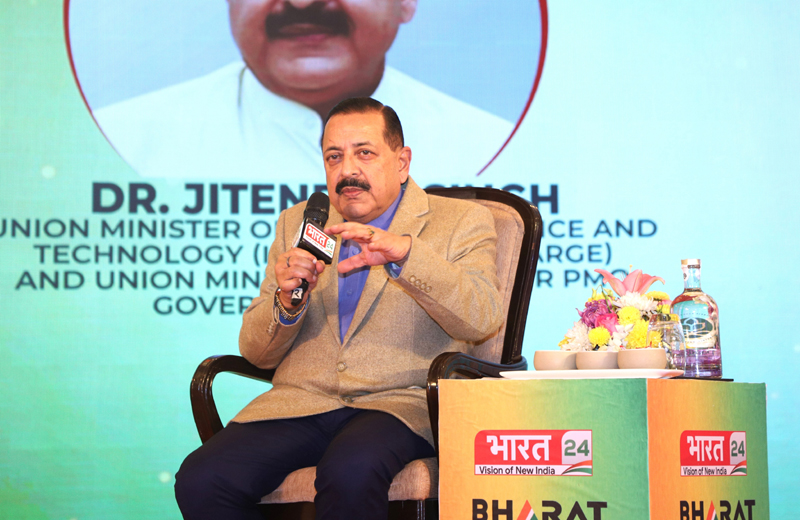Excelsior Correspondent
NEW DELHI, Dec 24: The Modi government has undertaken significant governance reforms, including the elimination of nearly 2,000 outdated regulations that had become irrelevant and hindered operational efficiency.
This information was shared today by Union Minister of State (Independent Charge) for Science and Technology and Earth Sciences, as well as Minister of State for the PMO, Department of Atomic Energy, Department of Space, Personnel, Public Grievances, and Pensions, Dr. Jitendra Singh during a TV conclave at the Taj Hotel.
On the occasion of Good Governance Day, which also commemorates the 100th birthday of former Prime Minister Atal Bihari Vajpayee, Dr. Jitendra Singh highlighted key achievements and the governance reforms initiated under Prime Minister Narendra Modi’s leadership.
Speaking to a responsive audience, Dr. Jitendra Singh stressed the Government’s dedication to transparency, innovation, and citizen-centered policies that have transformed governance in India.
The Minister detailed the focused efforts to remove obsolete laws, stating, “Nearly 2,000 old regulations have been discarded to streamline governance and enhance citizen engagement.”
He recalled that shortly after Narendra Modi became Prime Minister in May 2014, the Department of Personnel & Training repealed a longstanding rule requiring document attestation by a gazetted officer, signaling a government that trusts the youth.
In his Independence Day speech, Dr. Jitendra Singh noted that Modi called for the abolishment of interviews for lower-level job recruitments to enhance fairness, followed by the DoPT issuing a corresponding directive in 2016. He also mentioned a series of reforms aimed at simplifying pension regulations, particularly for senior citizens and provisions for divorced daughters’ family pensions.
One of the notable initiatives has been the incorporation of cleanliness into governance, transitioning from what might have been seen as mere administrative protocol into a nationwide movement. “Cleanliness has become a benchmark of governance,” Dr. Jitendra Singh remarked, reflecting on how the cleanliness initiative began with toilet construction and expanded to encompass the cleansing of government facilities and workspaces.
Shifting to a larger political context, Dr. Jitendra Singh emphasized the Modi administration’s impact on enhancing India’s unity and integrity. He specifically referenced the North East and Jammu & Kashmir, pointing to a change from regional isolation to inclusion. “Prior to 2014, the North East often felt disconnected from the rest of India—not merely in geographical terms but also emotionally,” he noted.
Under Modi’s guidance, frequent visits, infrastructure advancements, and socio-economic policies transformed the area into what the Minister referred to as “a model of development.”
In Jammu & Kashmir, Dr. Jitendra Singh described a similar transformation, where skepticism towards the central government has shifted to a sense of national unity. “We’ve transitioned from an era where even mentioning the BJP was frowned upon to one where our flag is proudly displayed in the region,” he stated. He attributed this shift to Modi’s policies, which focus on grassroots advancement and inclusivity.
He also addressed allegations put forth by the opposition, particularly from the Congress Party, accusing them of using divisive strategies and misinformation for political gain. Dr. Jitendra Singh argued that the Congress narrative of the BJP being exclusionary is contradicted by Modi’s inclusive governance, especially regarding welfare programs for Dalits, backward classes, and women. “The Congress relied on fostering misunderstandings about the BJP. Today, these myths are collapsing as citizens see the tangible results of Modi’s policies,” he asserted.


Leave a Reply